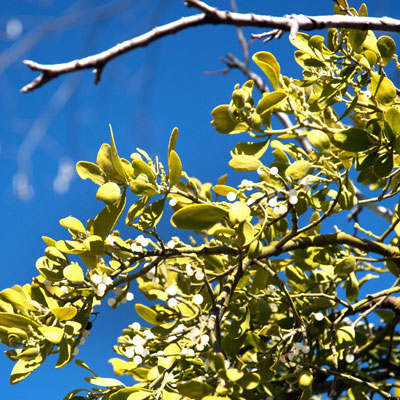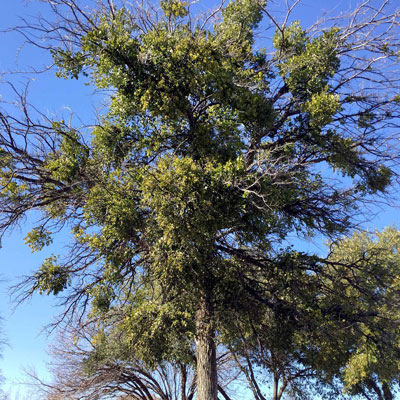Mistletoe Myths and Mystique
People spend good money buying mistletoe for their holiday decorations, but for tree people who have it in their large shade trees, it’s not a welcome guest. It spells utter frustration.

Mistletoe is a green plant with chlorophyll, so to some very tiny degree it’s able to manufacture its own sugars just like any normal plant would. But it’s a parasite of shade trees such as pecans, oaks, bois d’arcs and especially cedar elms and hackberries. Birds eat the berries and in the process they also get the sticky pulp stuck on their beaks. As they wipe their beaks to clean them, the seeds are planted on the surfaces of the new host trees. Roots start to develop, and within months, the plants are established and growing. Their roots penetrate into the wood of the tree, taking moisture and nutrients that would have been utilized by the trees’ leaves.
Birds normally perch on finger-sized tree branches that they can wrap their feet around. If you use a long-handled pole pruner to remove the mistletoe and the small twig entirely, you’ll keep ahead of your problems. Let it continue to grow for a few years, however, and the branch will grow larger and larger. After a few years, you’ll have a basketball-sized clump growing atop a limb the size of your leg, and trimming to remove the invader by pruning will be a lost opportunity.

Let’s say, however, that you move into a house where mistletoe has been allowed to run rampant. Is there any way to address it once it’s gotten a solid start on big branches? Have a certified arborist look at your tree. He or she will have access to a product or two that will help burn the mistletoe back. It probably won’t be killed out entirely, but you may see enough progress to justify the expense. These products are not available to consumers.
Can you use conventional weedkiller sprays to control your mistletoe problems? No. The mistletoe is actually rooted into the host tree. It becomes a grafted part of the tree, and the herbicide would assuredly be transported into the tree after the spraying.
Does mistletoe ever kill a tree? Rarely. However, it certainly weakens trees enough that their life expectancies may end up being shortened. Cedar elms and hackberries may appear to be almost evergreen trees. They have enough mistletoe in their branches that you can hardly tell when they’ve dropped all their leaves in the fall.
Finally, you’ll hear reports of mistletoe being poisonous, but those are basically unfounded (fake horticultural news). Nonetheless, you should teach the kids and grandkids not to be eating wild plants and their fruit unless they’re put on the table before them.
